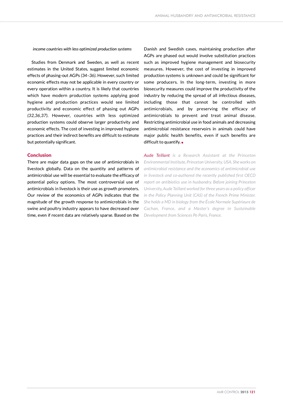
income countries with less optimized production systems
Studies from Denmark and Sweden, as well as recent
estimates in the United States, suggest limited economic
effects of phasing-out AGPs (34-36). However, such limited
economic effects may not be applicable in every country or
every operation within a country. It is likely that countries
which have modern production systems applying good
hygiene and production practices would see limited
productivity and economic effect of phasing out AGPs
(32,36,37). However, countries with less optimized
production systems could observe larger productivity and
economic effects. The cost of investing in improved hygiene
practices and their indirect benefits are difficult to estimate
but potentially significant.
Conclusion
There are major data gaps on the use of antimicrobials in
livestock globally. Data on the quantity and patterns of
antimicrobial use will be essential to evaluate the efficacy of
potential policy options. The most controversial use of
antimicrobials in livestock is their use as growth promoters.
Our review of the economics of AGPs indicates that the
magnitude of the growth response to antimicrobials in the
swine and poultry industry appears to have decreased over
time, even if recent data are relatively sparse. Based on the
Danish and Swedish cases, maintaining production after
AGPs are phased out would involve substitution practices
such as improved hygiene management and biosecurity
measures. However, the cost of investing in improved
production systems is unknown and could be significant for
some producers. In the long-term, investing in more
biosecurity measures could improve the productivity of the
industry by reducing the spread of all infectious diseases,
including those that cannot be controlled with
antimicrobials, and by preserving the efficacy of
antimicrobials to prevent and treat animal disease.
Restricting antimicrobial use in food animals and decreasing
antimicrobial resistance reservoirs in animals could have
major public health benefits, even if such benefits are
difficult to quantify. l
Aude Teillant is a Research Assistant at the Princeton
Environmental Institute, Princeton University, USA. She works on
antimicrobial resistance and the economics of antimicrobial use
in livestock and co-authored the recently published first OECD
report on antibiotics use in husbandry. Before joining Princeton
University, Aude Teillant worked for three years as a policy officer
in the Policy Planning Unit (CAS) of the French Prime Minister.
She holds a MD in biology from the École Normale Supérieure de
Cachan, France, and a Master's degree in Sustainable
Development from Sciences Po Paris, France.
ANIMAL HUSBANDRY AND ANTIMICROBIAL RESISTANCE
AMR CONTROL 2015 121